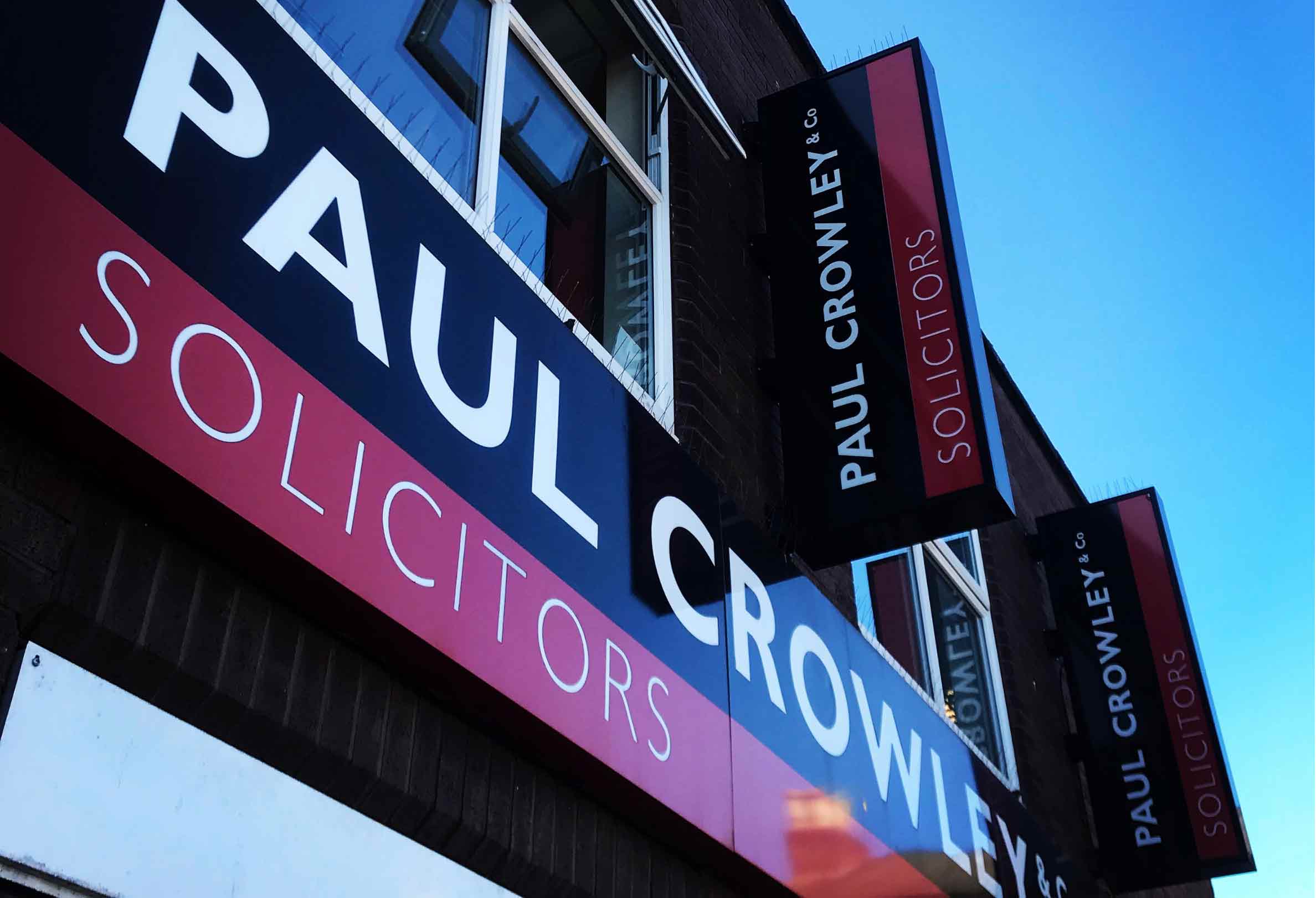When a family relationship breaks down, not only can it be an emotionally difficult and stressful time for the parents, it can also cause a great deal of distress for the children. At Paul Crowley & Co our team of family law solicitors are here to guide you with expert legal advice.
Family breakdowns effect children in many different ways, feelings of anger, sadness or fear are often experienced by the children, leading to problems for separated parents when arranging future contact for the non-resident parent.
If both parents cannot reach an amicable agreement for their child or children, a child arrangements order may be required and Paul Crowley & Co are here to help.
Paul Crowley & Co the family law experts
At Paul Crowley & Co solicitors our family law team have many years of experience in handling contact arrangements for children and providing expert legal advice for distressed parents when it matters most.
Paul Crowley & Co’s family law team are asked many questions from concerned parents about a child arrangement order after separation. Edwina Harkin, Head of Family Law at Paul Crowley & Co has provided answers too many of these questions for you.
‘If you are in a dispute with your ex-partner and require expert legal advice over where your child or children should live, or have a general question regarding existing contact arrangements, our family law department are here to help. For initial free no obligation legal advice call our family law team on 0151 264 7363 or contact us through our online enquiry form.’
Edwina Harkin | Head of Family Law
Paul Crowley & Co, Solicitors
What Is A Child Arrangement Order?
A child arrangements order is ultimately a court order between the parents/guardian setting out where a child/ren should live and who they should spend time with.
Contact arrangements – What does this mean?
Child Arrangements orders have replaced ‘Child Custody Laws’ and ‘Residence Orders’. The arrangements decide who the child or children should live with and how often they should spend time with the other parent.
When a couple separate they will often have completely different opinions on the upbringing of their child/ren. Child arrangements can vary greatly depending on the lifestyles of both parents.
It is in the best interests of the children if the parents can mutually agree on child contact arrangements. At Paul Crowley & Co we will advise a parent and strive to achieve the best possible outcome for that parent, but more importantly for the welfare of your children.
We are here to help…
To speak directly with our family law team please call 0151 264 7363 and a member of our team will be happy to assist.
What is the process when applying for a child arrangement order?
If child care arrangements cannot be agreed and communication has broken down between the parents, before applying to the court for a child arrangement order, it is a legal requirement that both parents must first attend a Mediation Information Assessment Meeting (MIAM).
The purpose of the MIAM is designed to establish whether the parents are able to reach an agreement through a process of mediation, as opposed to going to court.
There are instances where mediation would not be appropriate. For example, if domestic abuse has occurred or if the other parent/guardian of the child is unwilling to attend mediation.
What are the stages of a child arrangement order?
There are five stages to be completed when applying for a child arrangements order.
Stage One – Compare other options before applying to court
If the parents can reach an agreement without going to court, the outcome is usually better for both children and parents. Try to see if your dispute can be resolved another way before applying to court. If you are not in communication with your ex partner, Paul Crowley & Co can help you to negotiate.
Stage Two – Represent yourself or hire a solicitor
Hiring a solicitor
This will not be the cheaper of the two options, however it could be less stressful as your solicitor may be able to avoid going to court and negotiate a deal with the other parent. If you do decide to go to court your solicitor will handle all the legal work and represent you in court.
Representing yourself
You may prefer to represent yourself and speak to the judge directly, with the option of taking legal advice from a solicitor. This will be the less expensive option.
Stage Three – Mediation Information and Assessment Meeting (MIAM)
You must attend a MIAM, before you can apply for a court order. MIAM will assess if arrangements can be agreed out of court, unless exempt on the grounds of domestic abuse or if the other parent/guardian is unwilling to attend mediation.
Stage Four – Application for a court order
If mediation has failed Paul Crowley & Co can prepare the application for a child arrangement order on your behalf and arrange for the application to be issued and served upon the other party before arranging representation at the first court hearing.
If you decide to proceed, the court will ask a CAFCASS Officer (Children and Families Court Advisory and Support Service) to make safeguarding enquiries before filing a report with recommendations for a first hearing at court. This is also known as a safeguarding report.
Stage Five – Child Arrangements Court Process
First Hearing
The First Hearing Dispute Resolution Appointment (FHDRA) should ordinarily take place in week 5 following the issuing of the application. The Court will consider the safeguarding information and encourage both parties to resolve the issue by agreement. If an agreement can be made the case will end and the Court will make a final order.
If agreement cannot be reached, directions to progress the case or prepare for a fuller hearing will be made by the Court. At this stage interim orders can be made for contact, this can be either direct or indirect, unsupervised or supported by a third party.
If either of the two parties raise doubts regarding the welfare of the children, CAFCASS could be ordered by the Court to prepare a report. The report will take around 12 weeks to complete and will include a meeting between the allotted officer and both parties. If the feelings of the children are deemed important the officer may meet to speak with the children directly. CAFCASS will file a report making recommendations for what the arrangements should be for the children.
If there are factual disputes such as alleged domestic abuse, the Court could direct a Finding of Fact hearing to deal with those disputes first, both parties would have to provide written and give provide oral evidence at the hearing. If findings are made proceedings would continue on the basis of those findings. Directions with a view of progressing matters in the children’s best interests could be for either or both of the parties to attend a mental health assessment, a parenting programme or a drug or alcohol test.
Dispute Resolution Appointment
When directions have been complied with and any subsequent CAFCASS report, a further hearing will be arranged to see if matters can now be agreed and if so a final order will be made. If an agreement cannot be reached the case will be listed for a final hearing and the Court will usually direct both parties prior to the final hearing to file and serve statements of evidence that they seek to rely on in court.
Final Hearing
The final hearing is a form of trial where both parties will question the other parties’ evidence. If a report has been prepared by CAFCASS the officer will be present in court and can be examined on their recommendations at the hearing. The evidence will be presented and the Judge will make a decision on the final order arrangements for the children. This will be the end of the matter unless the order is not complied with in which case an additional application to court for enforcement may need to be made.
am I entitled to legal aid?
To see if you are entitled to legal aid call Rachel Gregory on 0151 264 7363 it will only take a few minutes to assess and then Paul Crowley & Co will do the rest.
how long will the child arrangement order process last?
It is difficult to put a timescale on a child arrangement order as it depends on a number of factors and whether there are any safeguarding concerns.
There is no standard time frame, it can take between 4–6 weeks from application to list for first hearing and 6–12 months to achieve a final order.
who can apply for a child arrangement order?
Anyone who is a guardian or holds parental responsibility for a child can apply for a child arrangement order. This can range from the child’s biological parent, step parent, grandparent or godmother/father figures.
If you do not have parental responsibility for the child, you will need to request permission from the court to make a separate application for parental responsibility. However this can also be avoided if the parent is willing to sign a Parental Responsibility Agreement with you.
can a child arrangement order be changed
Once the child arrangement order has been issued by the court it is possible to vary the child arrangement, however the court will need to reassess the facts to see what has changed to justify an amendment to the existing order before deciding on what’s in the child’s best interests.
If the order is something you are unable to agree upon with the other parental guardian, you should apply to vary the terms of the order, rather than denying access or breaching the order and potentially allowing the other party to apply for enforcement proceedings.
how long does a child arrangement order last?
Unless specifically stated otherwise in the order, or the court decides it should come to an end sooner, child arrangement orders will last until the child is 16, or in some exceptional circumstances, until the child reaches the age of 18.
Speak to a lawyer now…
To find out if you are entitled to legal aid, call Rachel Gregory on 0151 264 7363 it will only take a few minutes to decide and then Paul Crowley & Co will take care of the rest.
am i entitled to legal aid?
To find if you are eligible for Legal Aid please call Rachel from our family law team on 0151 264 7363 who will be happy to assist.
how paul crowley & co can help you
If you are in a dispute with your ex-partner and require expert legal advice over where your child or children should live, or have a general question regarding child arrangements after divorce, our family law department are here to help.
Our dedicated family law team at Paul Crowley & Co can provide you with initial expert free legal advice and guide you through any concerns you may have about Mediation or Child Arrangements Orders.
Follow us on social media
Keep up-to-date with Paul Crowley & Co by following us on social media! Tweet us or message us on Facebook:


 ‘If you are in a dispute with your ex-partner and require expert legal advice over where your child or children should live, or have a general question regarding existing contact arrangements, our family law department are here to help. For initial free no obligation legal advice call our family law team on
‘If you are in a dispute with your ex-partner and require expert legal advice over where your child or children should live, or have a general question regarding existing contact arrangements, our family law department are here to help. For initial free no obligation legal advice call our family law team on  Edwina Harkin | Head of Family Law
Edwina Harkin | Head of Family Law